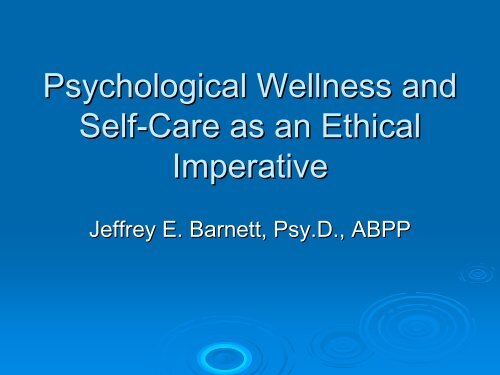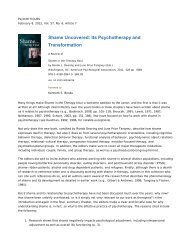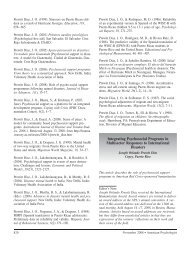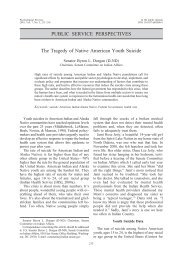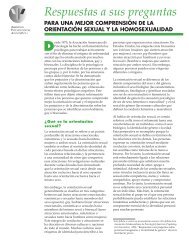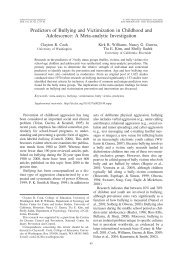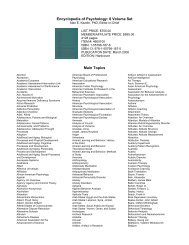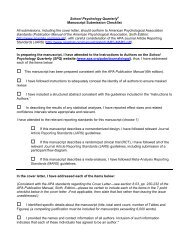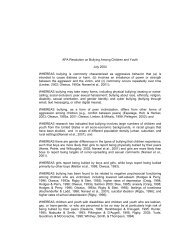Psychological Wellness and Self-Care as an Ethical Imperative
Psychological Wellness and Self-Care as an Ethical Imperative
Psychological Wellness and Self-Care as an Ethical Imperative
Create successful ePaper yourself
Turn your PDF publications into a flip-book with our unique Google optimized e-Paper software.
<strong>Psychological</strong> <strong>Wellness</strong> <strong><strong>an</strong>d</strong><br />
<strong>Self</strong>-<strong>Care</strong> <strong>Self</strong> <strong>Care</strong> <strong>as</strong> <strong>an</strong> <strong>Ethical</strong><br />
<strong>Imperative</strong><br />
Jeffrey E. Barnett, Psy.D., Psy.D.,<br />
ABPP
Why <strong>Self</strong>-<strong>Care</strong>? <strong>Self</strong> <strong>Care</strong>?<br />
Distress<br />
Burnout<br />
Vicarious Traumatization<br />
Burnout<br />
Impaired professional competence
Distress<br />
Distress: The subjective emotional<br />
response <strong>an</strong> individual experiences in<br />
response to <strong>an</strong>y of a number of<br />
challenges, dem<strong><strong>an</strong>d</strong>s, <strong><strong>an</strong>d</strong> stresses in<br />
one’s one s life (Barnett, Johnston, & Hillard, Hillard,<br />
2006).
Burnout<br />
Burnout: What Baker (2003) describes <strong>as</strong><br />
“the the terminal ph<strong>as</strong>e of therapist of distress” distress<br />
(p. 21).<br />
Emotional exhaustion, depersonalization,<br />
<strong><strong>an</strong>d</strong> a decre<strong>as</strong>ed sense of<br />
accomplishment.
Freudenberger (1984) described burnout<br />
<strong>as</strong> “a a depletion or exhaustion of a person’s person s<br />
mental <strong><strong>an</strong>d</strong> physical resources attributed<br />
to his or her prolonged, yet unsuccessful<br />
striving toward unrealistic expectations,<br />
internally or externally derived (p. 223).
Vicarious Traumatization<br />
Vicarious traumatization (secondary<br />
traumatic stress, comp<strong>as</strong>sion fatigue, co-<br />
victimization) described by Figley (1995)<br />
<strong><strong>an</strong>d</strong> others.<br />
Clinici<strong>an</strong>s who work with victims of trauma<br />
are at incre<strong>as</strong>ed risk of this developing.
Symptoms include intrusive thoughts <strong><strong>an</strong>d</strong><br />
images related to the client’s client s disclosures,<br />
avoid<strong>an</strong>t responses, physiologic arousal,<br />
somatic complaints, distressing emotions,<br />
<strong><strong>an</strong>d</strong> addictive or compulsive behaviors that<br />
may adversely impact one’s one s competence.
Competence<br />
The knowledge, skills, attitudes, <strong><strong>an</strong>d</strong><br />
values needed to practice effectively <strong><strong>an</strong>d</strong><br />
in accord<strong>an</strong>ce with prevailing professional<br />
st<strong><strong>an</strong>d</strong>ards.<br />
Establishing, maintaining, <strong><strong>an</strong>d</strong> losing<br />
competence.<br />
Competence, its natural decay, <strong><strong>an</strong>d</strong> what<br />
we c<strong>an</strong> do about it.
Impaired Professional Competence<br />
Distress left unchecked may result in <strong>an</strong><br />
impaired ability to effectively utilize <strong><strong>an</strong>d</strong><br />
implement our knowledge, skills, <strong><strong>an</strong>d</strong><br />
abilities.<br />
May be a gradual process <strong><strong>an</strong>d</strong> fall on a<br />
continuum.<br />
The line between distress <strong><strong>an</strong>d</strong> impairment<br />
may only be seen in the rearview mirror.
Impaired Competence in Practice<br />
Seventy five percent of psychologists<br />
acknowledged experiencing distress in the<br />
previous three years, 36.7%<br />
acknowledged that it adversely impacted<br />
the quality of care provided to clients, <strong><strong>an</strong>d</strong><br />
4.6% acknowledged that care provided<br />
w<strong>as</strong> inadequate <strong>as</strong> a result of distress<br />
experienced (Guy, Poelstra, Poelstra,<br />
& Stark,<br />
1989).
Similarly, Pope, Tabachnick, Tabachnick,<br />
<strong><strong>an</strong>d</strong> Keith- Keith<br />
Spiegel (1897) found 59.6% of mental<br />
health clinici<strong>an</strong>s surveyed acknowledging<br />
working when too distressed to be<br />
effective.<br />
Yet, 85% of them acknowledged that<br />
doing so w<strong>as</strong> unethical.
Why?<br />
Personal Factors <strong><strong>an</strong>d</strong> Vulnerabilities.<br />
Professional Factors <strong><strong>an</strong>d</strong> the nature of our<br />
work.<br />
Professional Blind Spot.<br />
The invisible line between personal <strong><strong>an</strong>d</strong><br />
professional.<br />
Psychotherapist <strong>as</strong> major component in<br />
therapeutic ch<strong>an</strong>ge.
Work Factors<br />
Work Factors: Setting, client type, lack of<br />
progress, chronic conditions <strong><strong>an</strong>d</strong> relapses,<br />
on-call on call schedules, crises, suicide attempts,<br />
violent <strong><strong>an</strong>d</strong> aggressive clients, m<strong>an</strong>aged<br />
care, administrative requirements<br />
professional isolation, fear of malpractice<br />
claims <strong><strong>an</strong>d</strong> ethics complaints, difficulties<br />
collecting fees, etc.
Personal Factors, Vulnerability,<br />
blind spots, <strong><strong>an</strong>d</strong> risk factors<br />
Personal Factors: Family, health, fin<strong>an</strong>cial,<br />
relationship, mental health, subst<strong>an</strong>ce<br />
abuse, <strong><strong>an</strong>d</strong> related issues.<br />
Each of these c<strong>an</strong> impact our current<br />
functioning <strong><strong>an</strong>d</strong> psychological wellness<br />
<strong><strong>an</strong>d</strong> must be appropriately addressed to<br />
avoid a negative impact on our functioning<br />
<strong><strong>an</strong>d</strong> on the quality of care we provide our<br />
clients.
Challenges Throughout the <strong>Care</strong>er<br />
Graduate students: The impossible situation. Practice<br />
good self-care, self care, but do a great job on every <strong>as</strong>signment,<br />
turn them in on time, do research, see clients, make<br />
money, have a life, …<br />
Early career: starting a practice or career <strong><strong>an</strong>d</strong> starting a<br />
family. Expectations <strong><strong>an</strong>d</strong> time pressures.<br />
Mid career: Raising a family, fin<strong>an</strong>ces, running a<br />
practice, seeking tenure, (divorce, remarriage, blended<br />
families?), etc.<br />
Later career: Raising a family, caring for aging parents,<br />
retirement pl<strong>an</strong>ning, declining health, etc.
Who Becomes a Psychologist?<br />
Dysfunctional motivators (Guy, 1987).<br />
History of emotional, physical, or sexual<br />
abuse, family dysfunction, <strong><strong>an</strong>d</strong> subst<strong>an</strong>ce<br />
abuse in up to 50% of all psychologists<br />
(Racusin Racusin, , Abramowitz, & Winter, 1981).<br />
Continuation of primary caretaker role <strong><strong>an</strong>d</strong><br />
potential for m<strong>as</strong>tery of chaotic<br />
environments (O’Connor, (O Connor, 2001).
Blind Spots<br />
Highly educated, experts in underst<strong><strong>an</strong>d</strong>ing<br />
emotional functioning, relationships, <strong><strong>an</strong>d</strong><br />
psychopathology.<br />
We provide treatment to others.<br />
We’re We re the professionals, not the patients!<br />
Focusing on others’ others issues <strong><strong>an</strong>d</strong> needs<br />
(<strong><strong>an</strong>d</strong> not our own).
What Does the APA Ethics Code<br />
Have to Say about all this?<br />
Principle A: Beneficence <strong><strong>an</strong>d</strong><br />
Nonmaleficence:<br />
Nonmaleficence:<br />
“Psychologists Psychologists strive to<br />
be aware of the possible effect of their<br />
own physical <strong><strong>an</strong>d</strong> mental health on their<br />
ability to help those with whom they work” work<br />
(p. 1062).
St<strong><strong>an</strong>d</strong>ard 2: Competence<br />
2.03 Maintaining Competence<br />
Psychologists undertake ongoing efforts to develop <strong><strong>an</strong>d</strong> maintain maintain<br />
their<br />
competence (p. 1063).<br />
2.06 Personal Problems <strong><strong>an</strong>d</strong> Conflicts<br />
(a) Psychologists refrain from initiating <strong>an</strong> activity when they know or<br />
should know that there is a subst<strong>an</strong>tial likelihood that their personal personal<br />
problems will prevent them from performing their work-related<br />
work related<br />
activities in a competent m<strong>an</strong>ner.<br />
(b) When psychologists become aware of personal problems that may<br />
interfere with their performing work-related work related duties adequately, they<br />
take appropriate me<strong>as</strong>ures, such <strong>as</strong> obtaining professional<br />
consultation or <strong>as</strong>sist<strong>an</strong>ce, <strong><strong>an</strong>d</strong> determine whether they should limit, limit,<br />
suspend, or terminate their work-related work related activities. (p. 1064)
The <strong>Self</strong>-<strong>Care</strong> <strong>Self</strong> <strong>Care</strong> <strong>Imperative</strong><br />
<strong>Self</strong>-care <strong>Self</strong> care <strong>as</strong> <strong>an</strong> ethical imperative.<br />
<strong>Self</strong>-care <strong>Self</strong> care <strong><strong>an</strong>d</strong> psychological wellness.<br />
The role of self-monitoring self monitoring <strong><strong>an</strong>d</strong> self-<br />
awareness.<br />
Maladaptive coping strategies.<br />
Attending to our emotional, physical, <strong><strong>an</strong>d</strong><br />
spiritual needs.<br />
Positive career sustaining behaviors.
The Role of Awareness<br />
<strong>Self</strong>-reflection <strong>Self</strong> reflection on <strong>an</strong> ongoing b<strong>as</strong>is.<br />
Honesty about the impact of stressors on our<br />
functioning <strong><strong>an</strong>d</strong> wellness.<br />
Know your personal warning signs –<br />
boredom, <strong>an</strong>ger, daydreaming, wishing you were<br />
somewhere else, ending sessions early, arriving<br />
late, missing or c<strong>an</strong>celing appointments, feeling<br />
fatigued, loss of enjoyment, low motivation,<br />
impaired sleep, self-medicating.<br />
self medicating.
Integrate <strong>Self</strong>-<strong>Care</strong> <strong>Self</strong> <strong>Care</strong> into your Daily<br />
Life<br />
Barnett <strong><strong>an</strong>d</strong> Sarnel (2003) recommend:<br />
Make adequate time for yourself.<br />
Do things you enjoy.<br />
Take care of yourself physically <strong><strong>an</strong>d</strong> spiritually.<br />
Say NO!<br />
Don’t Don t isolate yourself.<br />
Keep in mind that self-care self care is a good thing.
Watch out for warning signs, such <strong>as</strong> violating<br />
boundaries, self-medicating, self medicating, wishing patients<br />
would not show up, finding it difficult to focus<br />
on the t<strong>as</strong>k at h<strong><strong>an</strong>d</strong>, boredom, fatigue, missing<br />
appointments.<br />
Watch out for distress, burnout, <strong><strong>an</strong>d</strong><br />
impairment in your colleagues.<br />
Conduct periodic distress <strong><strong>an</strong>d</strong> impairment self-<br />
<strong>as</strong>sessments <strong><strong>an</strong>d</strong> seek help when it is needed.<br />
Focus on prevention.<br />
Make time for self-care! self care!
Seek out personal psychotherapy.<br />
Use colleague <strong>as</strong>sist<strong>an</strong>ce programs.<br />
Participate in peer support groups.<br />
Accept that you’re you re hum<strong>an</strong>, in need of<br />
<strong>as</strong>sist<strong>an</strong>ce, <strong><strong>an</strong>d</strong> a work in progress.<br />
Don’t Don t try to be perfect, to have it all, or to<br />
do it all. Know your limits <strong><strong>an</strong>d</strong> be realistic.<br />
Strive for bal<strong>an</strong>ce (a moving target <strong><strong>an</strong>d</strong><br />
<strong>as</strong>pirational goal at best)
Now, go have some fun, take a walk, visit<br />
a museum, spend time with friends, take a<br />
nap, relax, enjoy what Boston h<strong>as</strong> to offer,<br />
<strong><strong>an</strong>d</strong> be sure to get to every interesting<br />
presentation <strong><strong>an</strong>d</strong> event at the convention,<br />
get all the CE credits you need for the<br />
year, get the most out of every minute, be<br />
sure to exercise each morning, …


